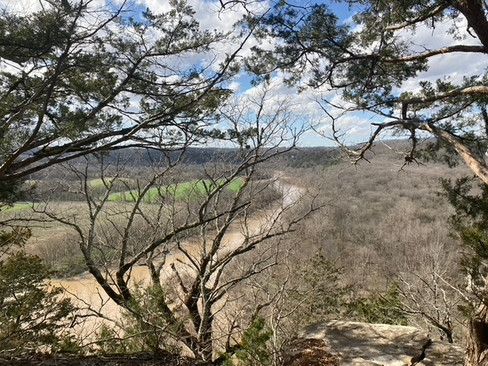Noggins in Nature
- Judith Wang
- May 23, 2021
- 6 min read
Linnea Delucchi is in the woods, teaching a group of kids away from cityscapes and bustling streets; in her free time, she’s going on trail-runs through nature. She’s busy earning her Master’s in Adventure Education and working with neurodiverse kids in North Carolina after completing her Molecular and Cellular Biology Degree with a focus on Neurobiology at UC Berkeley. She describes her best career decision to be the moment she chose to work in adaptive skiing--opening her up to opportunities to work with disadvantaged groups while still being outside, her favorite place to be.
What’s Adventure Education?
Linnea credits memorable experiences with her family and her bond with her half brother, who has severe autism, for her devotion to helping an underserved population and to showing how being outdoors can have a very positive impact on our lives. She is currently the Lead Campus Instructor at a boarding school for kids with learning disabilities (including but not limited to ADHD, autism, depression, anxiety, dyslexia, OCD, oppositional defiant disorder, and kids who are in and out of the foster system). Her role feels more like that of a holistic life mentor. The kids at the program are sent on two week long excursions and keep up with curriculum during these trips.
Getting scuba certified in the Florida Keys, canoeing in the Buffalo River in Arkansas, climbing in the New River Gorge, or backpacking in Pisgah National Forest are some of the experiences the kids get to have. The entire system could not be complete without a functioning team that includes teachers, instructors, and administrators. Together with structured lesson planning, the team is able to coordinate students in ways that make getting outside a rich learning experience.
It’s not all frolicking. The kids spend ten days on campus, in which teachers plan lessons to be done on the field (sometimes experiential) and field instructors present a plan and pack all the essentials including tarps, tents, and mess kits. The students are given roles and responsibilities. For instance, “Yoda” is the leader of the group, “Captain Planet” is in charge of trash, and Sherpa washes dishes. These roles switch every day. For front country trips, students have access to Wi-Fi and can otherwise use hotspot devices to access learning tools online.
Photos courtesy of Linnea Delucchi.
How she found her place in Adventure Education and Neurobiology
Linnea studied neurobiology at UC Berkeley and established her athletic presence on the Cal Women’s Ultimate Frisbee Team (Pie Queens, traditionally sponsored by local gem, Lois the Pie Queen). Those who have gotten to know her or met her on the field over the years may be able to attest to her level of resilience and be well acquainted with her infectious smile and laughter. Fewer know about her love and support towards her family at home.
Linnea is from Sacramento, a drive away from the shore and the mountains, where her parents took her backpacking when she was seven years old, white water rafting, and other adventures. Home is also where her half brother is--he’s fifteen, non-verbal, and has severe autism. “When he’s happy, he’s great,” she speaks with a refreshing sense of love and sincerity, “he’s [also] caused a lot of mental strain on [the family]...it can be scary when he can’t communicate, his way of communicating can be by taking it out on people around him.”
Savants like Temple Grandin, best known for her activism for the autistic community and her work in consulting and engineering for the cattle industry, skew the perception of people living on the spectrum.“ Oh, autism. So what’s your brother really good at, ”a question that Linnea has become tired of hearing. She’s worked with kids with autism for half a decade now and recalls but one savant.
During the hardest years attempting to communicate with her brother, he cracked two windshields from the inside of the car using his head. “He always smashes right here,” she points to her forehead, “we say he always has a little unicorn horn.” In the face of adversity, she finds some light.
Feeling a bit lost one summer, years ago, she became a ski instructor. It was something with which she felt familiar, though she never felt like the stereotypical ski bum chasing “fresh pow”. There, she realized that she can use the skills from working with her brother by working in adaptive skiing. It was one way she could help disadvantaged people enjoy the outdoors.
Photos courtesy of Linnea Delucchi.
In the following years, she tried her hand in various roles including being a community connector, in-home paraeducator, respite caregiver, and a guide for outdoor education and backpacking in New Zealand.
To be outside and helping people overcome personal barriers, is 100% what she wants to do.
Why We Advocate Getting Outside
Linnea points out that her experiences outside and her work in adaptive skiing has been a privilege she doesn’t take for granted. Not everyone can enjoy these experiences equally; they can be expensive, and even more so when specialized equipment is required (though the equipment available to enable people to experience things that able-bodied people typically have more access to is improving and impressive).
In a study ten years ago, Chang and Chang pointed out that “while children with autism rarely have their therapy conducted outdoors, outdoor activities could provide several benefits including promoting communication, emotion, cognition, interaction, physical activity, and decreasing autistic sensitivity”. Programs, such as the boarding school, help create a space away from the busy, sometimes convoluted, nature of modern society for neurodiverse kids to feel safe and practice honing meaningful social interactions while advancing their mental health.
Larger organizations, namely Autism Speaks, have recently changed their mission to reflect the intent to incorporate neurodiverse populations into society in place of their previous efforts to find means to “healing” people diagnosed with ASD. Their current mission reads “promoting solutions, across the spectrum and throughout the lifespan, for the needs of individuals with autism and their families through advocacy and support; increasing understanding and acceptance of autism spectrum disorder; and advancing research into causes and better interventions for autism spectrum disorder and related conditions’’.
The shift to find better methods aimed to empower individuals, teaching communication and implementing practices for people to use throughout their lifetime in being a part of our ever-colorful society is an important one.
Linnea teaches kids “to cope, adapt, work through their issues, be flexible...adapt to situations that are flat out not going to meet their needs to the extent they want them to.” She teaches them resiliency. She emphasizes letting kids know that turning in the assignment before it is exactly the way they planned it will be okay. She offers a sense of security in moments where uncertainty looms.
“People’s excitement and passion about things is transmittable and infectious.”
She stresses that there has to be an emotional connection for the kids to actively participate. Her goal is for more people to go outside so they “have more of a desire to protect it and live a more environmentally friendly life”. To Linnea, our physical and mental health and its relationship to the environment is all connected; she’s set out to prove it in the coming years.
What does “healthy” look like to you?
Linnea aims to create a positive influence on her own life by really focusing on how things make her feel--”whether that’s the mundane daily stuff or not”.

“If you go outside and think that that tree is the coolest thing in the world, take the time to explore that more. We live a very fast paced life because of technology or how we have access to things and it’s easy to breeze past things and not notice them. If we take that time to notice things, it will make us happier. If we make these things a larger priority, we can be happier.
For me that’s going outside--mountain biking, baking, or cooking. Lucky for me, cooking...because it’s also functional! Sometimes it can be a mundane simple thing like the sound of water. Sometimes it’s something that happens everyday that we can take the time to cherish.
Healthy is maintaining a healthy mindset towards yourself and to others. If you are proud of your body and in a good headspace? That’s awesome. The fact that you have a good headspace is awesome.”
Additional Resources and References:
https://sci-hub.se/https://www.sciencedirect.com/science/article/abs/pii/S157106451730012X?via%3Dihub Armstrong T. The healing balm of nature: Understanding and supporting the naturalist intelligence in individuals diagnosed with ASD. Phys Life Rev (2017), http://dx.doi.org/10.1016/j.plrev.2017.01.012
Masataka, N, Implications of the idea of neurodiversity for understanding the origins of developmental disorders, Phys Life Rev, 2017 Mar; 20:85-108. doi: 10.1016/j.plrev.2016.11.002. Epub 2016 Nov 9. PMID: 27876343.
Diament, M. Autism Speaks no longer seeking cure, Disability Scoop, October 14, 2016. https://www.disabilityscoop.com/2016/10/14/autism-speaks-no-longer-cure/22884/.
Chang Y-Y, and C-Y Chang. The benefits of outdoor activities for children with autism, 16th International Symposium on Society and Resource Management (ISSRM), June 6 - 10, 2010 Corpus Christi, Texas USA. https://www.researchgate.net/publication/266369570_The_Benefits_of_Outdoor_Activities_for_Childr en_with_Autism.
Dyck E., Russell G. (2020) Challenging Psychiatric Classification: Healthy Autistic Diversity and the Neurodiversity Movement. In: Taylor S., Brumby A. (eds) Healthy Minds in the Twentieth Century. Mental Health in Historical Perspective. Palgrave Macmillan, Cham. https://doi.org/10.1007/978-3-030-27275-3_8
We support BAWT (Bay Area Wilderness Training)! Check out the work they do in empowering youth leaders here in the SF Bay Area: https://www.bawt.org/
Have questions or want more? Sign up to be up to date with our new content for free!
Comment below or shout us out. We want to know what you think!

Written by:
Judith Wang
Founder, Project Green Beard
UCSC Banana Slug














Comments